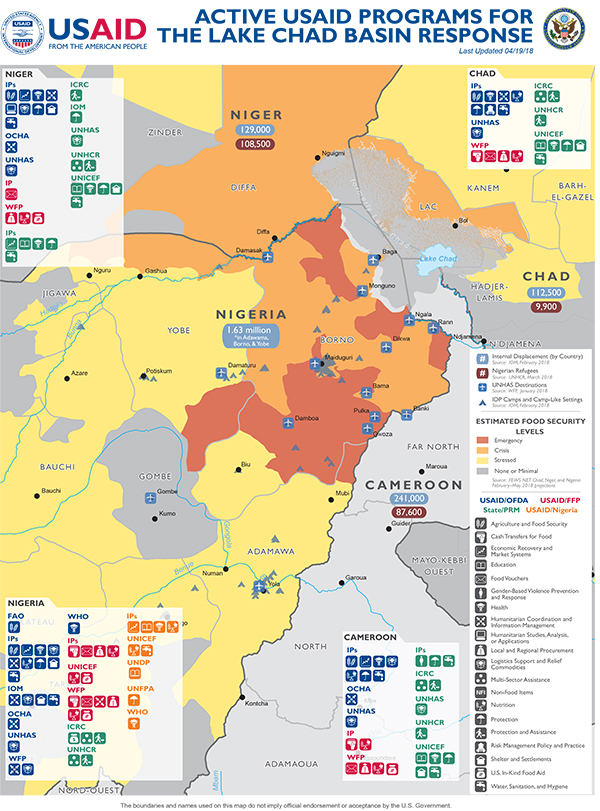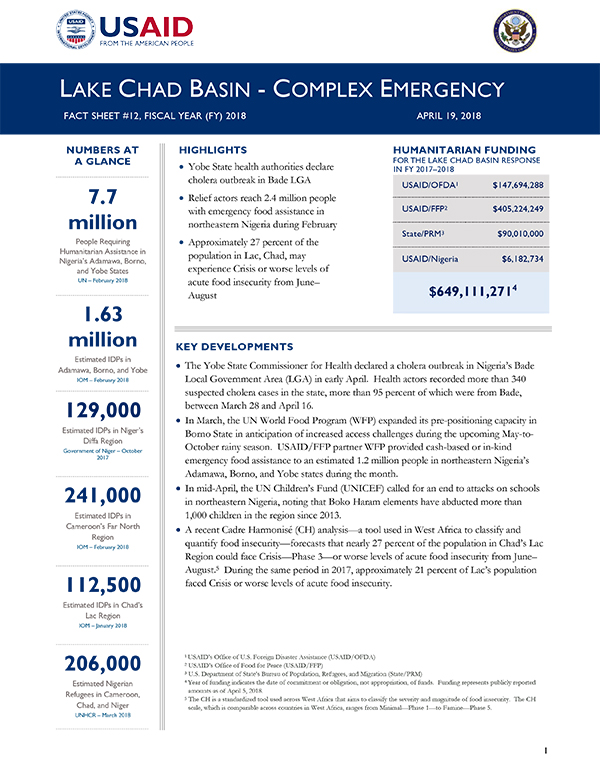- What We Do
- Agriculture and Food Security
- Democracy, Human Rights and Governance
- Economic Growth and Trade
- Education
- Environment and Global Climate Change
- Gender Equality and Women's Empowerment
- Global Health
- Humanitarian Assistance
- Transformation at USAID
- Water and Sanitation
- Working in Crises and Conflict
- U.S. Global Development Lab
Speeches Shim
April 24, 2018
Highlights
Yobe State health authorities declarecholera outbreak in Bade LGA
Relief actors reach 2.4 million peoplewith emergency food assistance innortheastern Nigeria during February
Approximately 27 percent of thepopulation in Lac, Chad, mayexperience Crisis or worse levels ofacute food insecurity from June–August
Lake Chad Map - 04-19-2018 ![]() (pdf - 588k)
(pdf - 588k)
Numbers At A Glance
7.7 million
1.63 million
129,000
241,000
112,500
206,000
Humanitarian Funding
For the Lake Chad Basin Response
| USAID/OFDA | $147,694,288 |
| USAID/FFP | $405,224,249 |
| State/PRM | $90,010,000 |
| USAID Nigeria | $6,182,734 |
| Total | $649,111,271 |
KEY DEVELOPMENTS
The Yobe State Commissioner for Health declared a cholera outbreak in Nigeria’s BadeLocal Government Area (LGA) in early April. Health actors recorded more than 340suspected cholera cases in the state, more than 95 percent of which were from Bade,between March 28 and April 16.
In March, the UN World Food Program (WFP) expanded its pre-positioning capacity inBorno State in anticipation of increased access challenges during the upcoming May-to-October rainy season. USAID/FFP partner WFP provided cash-based or in-kind emergency food assistance to an estimated 1.2 million people in northeastern Nigeria’s Adamawa, Borno, and Yobe states during the month.
In mid-April, the UN Children’s Fund (UNICEF) called for an end to attacks on schoolsin northeastern Nigeria, noting that Boko Haram elements have abducted more than 1,000 children in the region since 2013.
A recent Cadre Harmonisé (CH) analysis—a tool used in West Africa to classify andquantify food insecurity—forecasts that nearly 27 percent of the population in Chad’s LacRegion could face Crisis—Phase 3—or worse levels of acute food insecurity from June–August. During the same period in 2017, approximately 21 percent of Lac’s populationfaced Crisis or worse levels of acute food insecurity.
NIGERIA
The Yobe State Commissioner for Health declared a cholera outbreak in Bade LGA on April 6 following laboratory confirmation of 18 cholera cases. Between March 28 and April 16, health actors reported more than 340 suspected cholera cases and 15 related deaths. Bade accounts for more than 95 percent of suspected cholera cases and all associated deaths in Yobe, with health actors recording a total of 16 suspected cholera cases in Busari, Jakusko, Karasuwa, and Yusufari LGAs. Health partners have established a cholera treatment unit at Bade’s Gashua General Hospital to provide case management services. In addition, relief actors are conducting decontamination, health education, and hygiene promotion activities; distributing water, sanitation, and hygiene (WASH) supplies, including soap, water containers, and water purification tablets; and testing water quality. A USAID/OFDA partner began implementing hygiene promotion activities in Bade on April 6. Separately, health actors reported declining suspected cholera cases in Borno’s Kukawa LGA, with 13 additional cases reported between April 11 and April 17 and a total of 671 suspected cholera cases since March 8, when authorities declared a cholera outbreak in the LGA. Health actors continue to conduct disease surveillance and WASH response activities—including chlorination of water sources, disinfection of latrines, and hygiene promotion sessions—in Kukawa.
Humanitarian actors provided emergency food assistance to more than 2.4 million people in Adamawa, Borno, and Yobe in February. An estimated 1.1 million people received in-kind food assistance and 1.3 million people received cash-based assistance, according to the Food Security Sector Working Group—the coordinating body for humanitarian food security activities in Nigeria, comprising UN agencies, non-governmental organizations (NGOs), and other stakeholders.
In March, WFP expanded its storage capacity in the less accessible areas of Ngala and Rann towns in Borno, facilitating the pre-positioning of food commodities in preparation for the upcoming May-to-October rainy season, when deteriorating transport conditions limit humanitarian access to populations in need in those areas. Also in March, USAID/FFP partner WFP reached approximately 1.2 million people in Adamawa, Borno, and Yobe with in-kind or cash-based emergency food assistance.
USAID/FFP also supported an NGO partner to reach approximately 225,000 vulnerable people in Borno and Yobe with emergency in-kind or cash-based food assistance in March. In addition, the partner screened more than 600 children ages five years and younger in Borno for acute malnutrition and provided education on post-natal care for approximately 300 pregnant and lactating women and hygiene practices for an estimated 400 pregnant and lactating women.
In mid-April, UNICEF called for a cessation of attacks on schools in northeastern Nigeria and advocated the release of abducted children still held captive, noting that since 2013 Boko Haram elements have abducted more than 1,000 children from schools in the region. According to UNICEF, conflict since 2009 has resulted in the deaths of an estimated 2,300 teachers and destruction of more than 1,400 schools.
A USAID/OFDA partner reported domestic violence, sex in exchange for food or resources to meet basic needs, and sexual exploitation by security forces as primary protection concerns in areas of operation in Borno’s Banki, Dikwa, and Ngala towns. Single, divorced, or widowed women and girls are at higher risk for abuse and exploitation. In Banki, seven out of eight cases of rape were reported by women and girls who did not have access to livelihoods or other forms of support to complement humanitarian assistance, according to the partner. The partner continues to advocate through the Gender-Based Violence (GBV) Sub-Sector Working Group for humanitarian organizations to train security personnel on protection against GBV and sexual abuse and exploitation. USAID/OFDA also supports the partner to manage a safe space in Banki, which provides case management and psychosocial support programs for women and girls such as skills-acquisition activities, educational sessions, and life skills courses for adolescent girls.
In December 2017 and January 2018, the UN Food and Agriculture Organization (FAO), the Office of the UN High Commissioner for Refugees (UNHCR), and WFP conducted a Safe Access to Fuel and Energy (SAFE) assessment, surveying more than 8,900 people—including more than 5,900 internally displaced persons (IDPs) in Borno’s Gwoza, Jere, Konduga, and Ngala LGAs. Nearly 70 percent of respondents identified protection risks as the primary challenge in accessing energy sources, with approximately 85 percent of respondents reporting protection risks when collecting firewood. Overall, approximately 76 percent of those surveyed reported insufficient energy resources. Insufficient access to energy sources also generates additional health and nutrition risks. The assessment recommended increasing access to fuel-efficient sources, such as briquettes—blocks of compressed charcoal or coal dust—and fuel-efficient cookstoves, as well as promoting sustainable management of wood sources. Given the widespread protection risks associated with collection of fuel sources, a USAID/OFDA partner recently conducted a training for members of the SAFE Working Group—part of the Food Security Sector—on the provision of alternative energy sources as a GBV-prevention measure.
In early April, a series of fires broke out in and near the IDP camp in Borno’s Rann town, injuring 14 people and burning more than 1,000 shelters in the camp, according to local media. Relief agencies are erecting 500 emergency shelters to decongest affected areas and working to address persistent shelter gaps.
In January and February, USAID partner UNICEF supported the treatment of more than 41,400 children ages 6–59 months for severe acute malnutrition treatment in northeastern Nigeria. During the same period, UNICEF reached nearly 38,200 children ages 6–23 months with micronutrient supplements and more than 61,800 caregivers of children ages 0–23 months with infant and young child feeding counseling to prevent acute malnutrition. USAID/FFP and USAID/OFDA have provided more than $13.6 million in FY 2017–2018 funding to support UNICEF’s activities in northeastern Nigeria.
CAMEROON
On April 6, Cameroonian authorities halted UNHCR efforts to transport 160 Nigerian refugees and asylum-seekers from Cameroon’s Waza town, Far North Region, to the country’s Minawao Refugee Camp. The Cameroonian army returned the displaced people to Nigeria’s Ngala IDP site on April 10, according to UNHCR. In response, the UN agency reiterated its call for protection of populations fleeing insecurity in northeastern Nigeria and an end to forced returns in the region.
CHAD
The Government of Chad, in collaboration with food security actors, recently released an updated CH report. The report noted that nearly 133,000 people in Lac will likely face Crisis or worse levels of food insecurity through the end of May and projected that more than 159,000 people, nearly 27 percent of Lac’s population, could experience Crisis or worse levels of acute food insecurity from June–August, a period covering the agricultural lean season and the end of the pastoral lean season. This figure represents an increase from the CH projection for the same period in 2017, which found that an estimated 123,000 people in Lac—approximately 21 percent of the population—would face Crisis or worse levels of acute food insecurity.
From January to February, a USAID/OFDA partner conducted agricultural, food security, and WASH activities in 10 villages across Fouli and Kaya departments in Lac. The partner is supporting 15 gardening groups to promote household food security and resilience. In January and February, 10 groups began harvesting crops, more than half of which was for household consumption while the remaining crops were sold. The partner also continued hygiene promotion efforts, reaching more than 880 people in January and more than 1,100 people in February. In addition, the partner led 20 sessions on proper latrine use and effective waste management in the area.
NIGER
From mid-February to mid-March, a USAID/OFDA partner completed the first month of its cash-for-work program—including agricultural activities to mitigate environmental degradation—in Chetimari, Diffa, and Gueskerou communes in Niger’s Diffa Department. Through the program, approximately 1,100 households each received 32,500 West African francs—approximately $61. Security restrictions in Diffa have prevented overnight staff presence in some areas of the program’s operation, prompting the partner to request special exemptions to authorize some team members to remain in targeted villages overnight to provide needed monitoring and oversight services.
CONTEXT
Years of conflict perpetuated by Boko Haram and Islamic State of Iraq and Syria–West Africa have triggered a humanitarian crisis in Nigeria and surrounding countries in the Lake Chad Basin region, including areas of Cameroon, Chad, and Niger. The escalating violence—including deliberate attacks on civilians and relief workers—has displaced more than 2 million people; hindered agricultural production, livelihoods, and cross-border trade; prevented delivery of humanitarian assistance; and restricted affected populations from accessing basic services in the four countries.
The UN estimates that nearly 11 million people in the region require humanitarian assistance, including approximately 7.7 million people in northeastern Nigeria’s three most-affected states—Adamawa, Borno, and Yobe. Populations in the Lake Chad Basin remain highly dependent on emergency food assistance to meet basic food needs, in addition to requiring emergency health, nutrition, protection, shelter, and WASH interventions.
On November 10, 2016, USAID activated a Disaster Assistance Response Team (DART) to lead the U.S. Government response to the humanitarian crisis in northeastern Nigeria. USAID also stood up a Washington, D.C.-based Response Management Team to support the DART.
U.S. Chargé d’Affaires, a.i., Matthew D. Smith, U.S. Ambassador Geeta Pasi, U.S. Chargé d’Affaires, a.i., Phillip Nelson, and U.S. Ambassador W. Stuart Symington have re-declared disasters for FY 2018 due to the ongoing complex emergencies and humanitarian crises in Cameroon, Chad, Niger, and Nigeria, respectively.



Comment
Make a general inquiry or suggest an improvement.